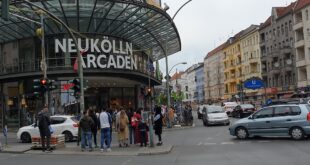It’s an inspiring story of how to turn adversity to advantage. After working on farms in southern Italy for pitiful salaries, in 2012 some migrants from West Africa decided to start their own agricultural co-operative near Rome. The business, which produces organic yoghurts and vegetables and delivers them by bike, is entirely environmentally friendly. Chloé Lauvergnier reports.
The co-operative is called Barikamà, which means “resilience” in Bambara, Mali’s principal language. The name is an homage to the travails of the eight people who currently work full-time at the company, and who hail from Mali, Senegal, the Gambia, Benin and Guinea.
The founder is Suleiman Diara, a 32-year-old Malian who arrived in Italy without residency papers in 2008 after crossing the Mediterranean aboard a boat. At first, he worked on a farm near Rosarno, in the country’s south, earning 20 euros a day for 12 hours of labour. “We slept in shacks made of cardboard and plastic tarps; we were like slaves,” he says.

Everything changed in January 2010. Hundreds of African farm workers led a revolt in Rosarno after several of them were attacked by local residents. This resulted in a campaign of further attacks against the migrants, and the authorities decided to evacuate them from the area.
Directly affected by the violence, Diara decided to leave for Rome with about a hundred other migrants. Unable to find work there, he started making and selling yoghurt with a Gambian friend to earn a bit of money, beginning with just a few litres of milk. The two men were later joined by Cheikh Diop, a 31-year-old Senegalese immigrant who’d arrived in Italy in 2007.
We began by making yoghurt, because it’s easy to make. In Africa, all you have to do is let the milk sit for a few hours, so that it curdles, and you’ve got yoghurt. That said, we quickly realised that in Italy it would be a lot more complicated, notably because it’s much cooler than it is in Africa. So a lady told us to add a lactic starter culture to the milk, so that it would turn more quickly. From then on, that became how we make our yogurts.
At the start, we made our yoghurts in the social centre where we were being housed, and we sold them at a market. Progressively, people started to hear about us.
In 2012, we won €20,000 in a contest for young entrepreneurs. It was at this moment that we launched the cooperative, and that we started producing our yoghurts on a farm — the ‘Casale di Martignano’ — located about 40 kilometres northwest of Rome. We pay the owners of the farm to be allowed to do our production there. Currently, we’re going through 250 litres of milk per week, which allows us to produce about 220 litres of yoghurt.

We’re conscious of environmental issues, probably because we come from rural areas. So we use organic milk. We have it brought in from Amatrice [Editor’s note: a town located 160km from their farm], because we haven’t been able to find any farm closer by. We also deliver our yoghurts by bike, because it’s a fast and non-polluting means of transportation. Additionally, our clients always return the yoghurt jars after finishing the yogurt, which allows us to reuse them.
We sell what we make to individual consumers, in bars and in restaurants, in the area around the farm and in Rome. We charge €6.60 for one litre of yoghurt. People like our yoghurts because they’re artisanal. Some older people tell us: “50 years ago, it was natural like this, there weren’t any preservatives.”
In 2014, we started growing organic vegetables at the farm, too. We currently sell 200 kilos-worth each week. And now we’ve hired an Italian with Asperger’s syndrome part-time. He manages our Facebook account and our website, and responds to emails.

Beyond the money, this work has really helped us to learn Italian, to get to know Rome, and to meet a lot of people. Additionally, it means we can give a positive image of migrants. That’s important, because they’re often demonized in Italy. We’d really like to get the following message out: what you really must not do is wait for someone to give you work!
In the short term, we’d like to keep growing our business, to be able to hire more people. But in the long term, we’d like to go back to Africa to do the same thing and create jobs there, while also explaining to people that life in Europe isn’t so easy for Africans…
 THE AFRICAN COURIER. Reporting Africa and its Diaspora! The African Courier is an international magazine published in Germany to report on Africa and the Diaspora African experience. The first issue of the bimonthly magazine appeared on the newsstands on 15 February 1998. The African Courier is a communication forum for European-African political, economic and cultural exchanges, and a voice for Africa in Europe.
THE AFRICAN COURIER. Reporting Africa and its Diaspora! The African Courier is an international magazine published in Germany to report on Africa and the Diaspora African experience. The first issue of the bimonthly magazine appeared on the newsstands on 15 February 1998. The African Courier is a communication forum for European-African political, economic and cultural exchanges, and a voice for Africa in Europe.






















